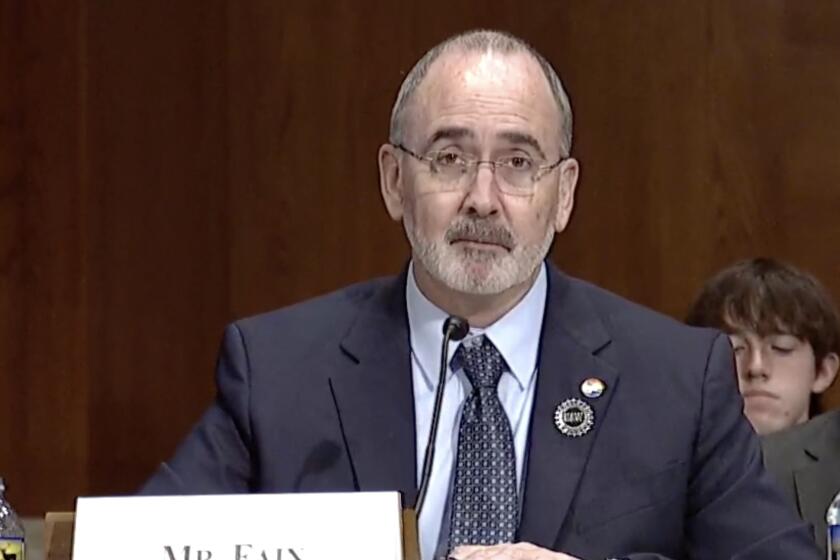Want the right to ignore your boss’ calls after hours? California could make that happen

- Share via
A San Francisco lawmaker is proposing a bill that would make California the first state in the country to give workers the right to ignore after-hours calls, emails and texts from their employers.
Assembly Bill 2751, introduced by Assemblyman Matt Haney (D-San Francisco), would create a “right-to-disconnect” law that guarantees workers uninterrupted personal and family time, free from calls or messages after work hours. It also mandates employers to create and publish plans to implement the new law into their policies and empower the California Labor Commissioner’s Office to investigate and fine employers who habitually violate it.
But the bill already has opposition from business advocacy groups who worry the legislation might create more headaches than its worth.
Haney said the bill aims to set a boundary between work and home life that in recent years has been blurred by smartphones and the shift to remote work pushed further by the pandemic.
“Work has changed drastically compared to what it was just 10 years ago,” Haney said. “People have to be able to spend time with their families without being constantly interrupted at the dinner table or their kids’ birthday party, worried about their phones and responding to work.”
Evidence shows that a 32-hour, four-day workweek with no reduction in pay is good for workers and employers. Why isn’t it a rule in the U.S.?
A survey of 41 advanced countries conducted by the Organization for Better Economic Co-operation and Development found that the United States ranked 29th when it came to work-life balance. It also found that 10% of U.S. residents worked 50 hours or more a week on average.
Studies have shown that workers who lack a healthy work-life balance are likely to experience burnout, anxiety, stress and other mental health conditions. That is especially the case for women and working parents.
A 2021 survey by Mind Share Partners, a nonprofit focused on workplace mental health, found that 84% of respondents said their workplace had contributed to at least one mental health condition. Last year, the nonprofit conducted another survey and found improvements had been made but that mental health issues overall still continued to plague the workforce.
Haney said the bill would reinforce California as a forward-thinking state and it would join about a dozen countries including France, where the idea originated in 2017.
Last month, Australia appeared to be the latest country to approve legislation that grants workers the right to disconnect.
Tyler Jochman, an attorney who has conducted research on compensation under the right-to-disconnect laws, said such legislation is important for workers’ health, especially for people working from home. It also further ensures that people are paid for the time they work.
But the law might cause some issues for companies who have branches in other states with different time zones. It also raises questions about the impact it will have on pay and exempt employees.
“We could see a redefinition of a salary employee,” Jochman said.
L.A. is among several cities nationwide that have adopted scheduling laws, part of a growing recognition that schedules are as important to well-being as wages and sick pay.
Those were among some of the issues raised by the California Chamber of Commerce, which opposes the bill.
In an April 1 letter, Ashley Hoffman, senior policy advocate for the chamber, wrote that the bill was vague and failed to consider the state’s longstanding laws regarding hours worked and exempt employees, and did not account for the uniqueness of different industries and professions.
“The bill may effectively ban overtime unless it is pre-planned,” she wrote. “That would result in significant lost wages for workers who regularly want to work overtime.”
She also raised concerns that the bill appears to apply to exempt employees who are paid a regular salary regardless of hours worked and are not subject to laws like overtime or meal or rest requirements.
“Requiring employers to assign those exempt workers ‘nonworking hours’ completely defeats the intent behind being an exempt employee,” Hoffman wrote. “It also restrains an employee’s flexibility.”
Haney could not immediately be reached for comment. But as part of his statement announcing the bill, he said the legislation has flexibility to make sure it works for everyone, including sectors that may require on-call work or longer hours.
He said it would also make an exception for after-work contact during emergencies or to discuss scheduling. It also makes exceptions for labor unions to allow collective bargaining agreements to supersede the law.
“Many of California’s larger employers are already abiding by the right-to-disconnect laws in other countries and choosing to grow their companies rapidly in those places,” he said. “They’re providing their French, Portuguese and Irish employees a clear delineation between ‘work time’ and non-work time,’ they’re just not doing that for Californians.”
More to Read
Sign up for Essential California
The most important California stories and recommendations in your inbox every morning.
You may occasionally receive promotional content from the Los Angeles Times.
















